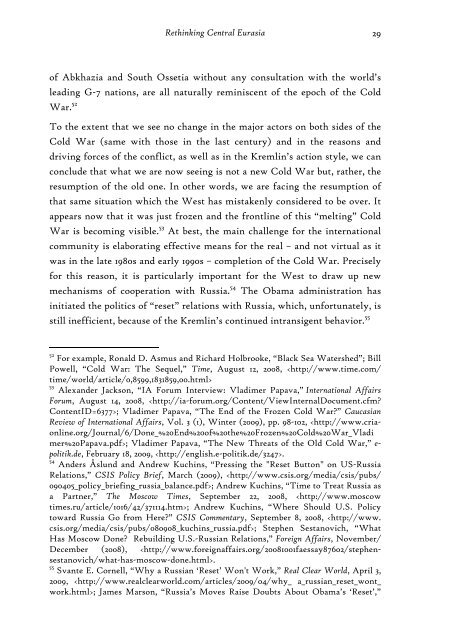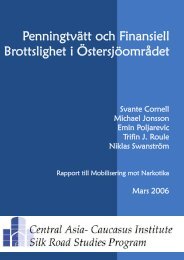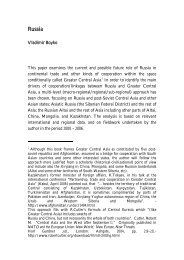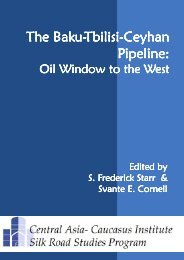Eurasianism and the Concept of Central Caucaso-Asia
Eurasianism and the Concept of Central Caucaso-Asia
Eurasianism and the Concept of Central Caucaso-Asia
You also want an ePaper? Increase the reach of your titles
YUMPU automatically turns print PDFs into web optimized ePapers that Google loves.
Rethinking <strong>Central</strong> Eurasia 29<br />
<strong>of</strong> Abkhazia <strong>and</strong> South Ossetia without any consultation with <strong>the</strong> world’s<br />
leading G-7 nations, are all naturally reminiscent <strong>of</strong> <strong>the</strong> epoch <strong>of</strong> <strong>the</strong> Cold<br />
War. 52<br />
To <strong>the</strong> extent that we see no change in <strong>the</strong> major actors on both sides <strong>of</strong> <strong>the</strong><br />
Cold War (same with those in <strong>the</strong> last century) <strong>and</strong> in <strong>the</strong> reasons <strong>and</strong><br />
driving forces <strong>of</strong> <strong>the</strong> conflict, as well as in <strong>the</strong> Kremlin’s action style, we can<br />
conclude that what we are now seeing is not a new Cold War but, ra<strong>the</strong>r, <strong>the</strong><br />
resumption <strong>of</strong> <strong>the</strong> old one. In o<strong>the</strong>r words, we are facing <strong>the</strong> resumption <strong>of</strong><br />
that same situation which <strong>the</strong> West has mistakenly considered to be over. It<br />
appears now that it was just frozen <strong>and</strong> <strong>the</strong> frontline <strong>of</strong> this “melting” Cold<br />
War is becoming visible. 53 At best, <strong>the</strong> main challenge for <strong>the</strong> international<br />
community is elaborating effective means for <strong>the</strong> real – <strong>and</strong> not virtual as it<br />
was in <strong>the</strong> late 1980s <strong>and</strong> early 1990s – completion <strong>of</strong> <strong>the</strong> Cold War. Precisely<br />
for this reason, it is particularly important for <strong>the</strong> West to draw up new<br />
mechanisms <strong>of</strong> cooperation with Russia. 54 The Obama administration has<br />
initiated <strong>the</strong> politics <strong>of</strong> “reset” relations with Russia, which, unfortunately, is<br />
still inefficient, because <strong>of</strong> <strong>the</strong> Kremlin’s continued intransigent behavior. 55<br />
52 For example, Ronald D. Asmus <strong>and</strong> Richard Holbrooke, “Black Sea Watershed”; Bill<br />
Powell, “Cold War: The Sequel,” Time, August 12, 2008, <br />
53 Alex<strong>and</strong>er Jackson, “IA Forum Interview: Vladimer Papava,” International Affairs<br />
Forum, August 14, 2008, ; Vladimer Papava, “The End <strong>of</strong> <strong>the</strong> Frozen Cold War?” Caucasian<br />
Review <strong>of</strong> International Affairs, Vol. 3 (1), Winter (2009), pp. 98-102, ; Vladimer Papava, “The New Threats <strong>of</strong> <strong>the</strong> Old Cold War,” epolitik.de,<br />
February 18, 2009, .<br />
54 Anders Åslund <strong>and</strong> Andrew Kuchins, “Pressing <strong>the</strong> "Reset Button" on US-Russia<br />
Relations,” CSIS Policy Brief, March (2009), ; Andrew Kuchins, “Time to Treat Russia as<br />
a Partner,” The Moscow Times, September 22, 2008, ; Andrew Kuchins, “Where Should U.S. Policy<br />
toward Russia Go from Here?” CSIS Commentary, September 8, 2008, ; Stephen Sestanovich, “What<br />
Has Moscow Done? Rebuilding U.S.-Russian Relations,” Foreign Affairs, November/<br />
December (2008), .<br />
55 Svante E. Cornell, “Why a Russian ‘Reset’ Won't Work,” Real Clear World, April 3,<br />
2009, ; James Marson, “Russia’s Moves Raise Doubts About Obama’s ‘Reset’,”






